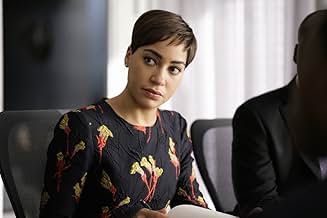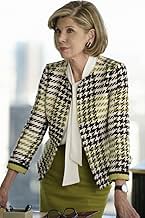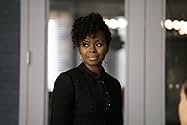Inauguration
- Episode aired Feb 19, 2017
- TV-MA
- 48m
After a financial scam destroys the reputation of lawyer Maia Rindell, while wiping out her mentor and godmother, Diane Lockhart's, savings; Maia and Diane join one of Chicago's preeminent l... Read allAfter a financial scam destroys the reputation of lawyer Maia Rindell, while wiping out her mentor and godmother, Diane Lockhart's, savings; Maia and Diane join one of Chicago's preeminent law firms.After a financial scam destroys the reputation of lawyer Maia Rindell, while wiping out her mentor and godmother, Diane Lockhart's, savings; Maia and Diane join one of Chicago's preeminent law firms.
Featured reviews
Eight Years Later: Revisiting the Shock that Became DNA
As a European viewer, I approach American television as something more than entertainment: it is a cultural laboratory. The U. S. tests political and societal extremes that other nations later absorb and recontextualize. In this light, The Good Fight is not just a spin-off of The Good Wife, but a necessary mutation. And, like all meaningful mutations, it begins in trauma.
If The Good Wife was a political and emotional Bildungsroman, its successor is something else entirely: a sophisticated elegy turned manifesto. The Good Fight doesn't merely open in shock-it absorbs that shock into its genetic code. The series begins with Diane Lockhart, a pillar of liberal elegance and institutional faith, watching Donald Trump's inauguration in stunned silence. A moment of perfect symbolic clarity: the screen flickers, and something shatters-not just her retirement plans, but her worldview.
The pilot, as conceived in October 2016, envisioned Diane's departure following a Clinton win, a moment she believed would justify her life's work. Then, reality intervened. With Trump's election occurring during production, the show pivoted, portraying Diane as utterly stunned and unable to function professionally.
While The Good Wife stretched out its final season to ride the emotional inertia of the Obama era and Hillary Clinton's anticipated victory, The Good Fight is entirely post-illusion. It emerges from loss, from freefall. And it knows it. The opening credits alone-Diane's refined world of vases, handbags, stilettos, laptops, and telephones blown to pieces-is a sublime visual metaphor. This is not mere narrative upheaval; it is aesthetic rage. The bourgeois liberal dream doesn't fade quietly. It explodes.
In a stroke of irony so sharp it borders on satire, Diane, who was once the embodiment of white, educated, feminist privilege, is now hired at a majority-Black law firm as a "diversity" partner. But the show isn't mocking her. It's reorienting the narrative. Her symbolic capital-her name, her politics, her poise-carries less weight here. And that's the point. She must now function in a space where she is no longer the axis. It's not just narrative comeuppance. It's ethical recalibration. The story no longer revolves around whiteness, comfort, or prestige-it moves toward Black voices, queer stories, and radical feminist critiques.
Here lies the core divergence from The Good Wife. That show started with a personal trauma-the betrayal of Peter Florrick-and used it to explore structures of power. The Good Fight begins with collective trauma and uses it to unravel the personal as inherently political. Maya, Diane's goddaughter, isn't just lost; she's emblematic of a generation promised progress and delivered disillusionment. The betrayal of her corrupt father is a generational rupture. She is a liberal millennial stripped of legacy and direction. Both women, in their own ways, are cast out of paradise: one from ideological security, the other from familial stability.
To me, The Good Fight doesn't seek continuity with The Good Wife-it seeks disobedience. If The Good Wife asked whether a woman could redefine herself within the system, The Good Fight asks whether the system itself should still exist. Reddick, Boseman & Lockhart is not just a new office-it is an alternate political utopia. A place where different rules apply, where different leadership emerges, and where different kinds of grief speak in different tongues. It's The Good Wife on a political acid trip.
And no, I don't believe Trump caused the collapse of a world. He revealed it. The Good Fight understands this with uncanny precision. The show is not just an act of resistance-it is an exorcism. It doesn't try to restore the pre-Trump order. It insists that order was already rotten. Trump didn't storm the gates of a pristine garden; he turned the lights on in a paper-mâché Eden.
That first scene is powerful not for what it shows, but for what it suggests: Diane doesn't just witness a transition of power-she sees the collapse of her belief in the social contract, in the protective promise of civilization. She is meritocracy incarnate: white, liberal, well-dressed, institutionally embedded. And suddenly, that world no longer recognizes her. She no longer knows how to move through it.
That's what makes The Good Fight such a rare gem. It doesn't just build on its predecessor-it interrogates it. It doesn't settle for catharsis; it demands reckoning. It's a work of art forged in fire, sculpted with fury, and polished with intellect. And like all great art, it forces you to ask: What story were we living in? And who did it serve?
Did you know
- TriviaThe show filmed two versions of the pilot due to the unexpected outcome of the 2016 Presidential election. As the production had erroneously assumed that Hillary Clinton would be a shoo-in, a second version was shot with Diane Lockhart (Christine Baranski) staring incredulously at her television screen as the announcement that Donald Trump had become the 45th President of the United States.
- GoofsWhen Diane announces her retirement, she states one of the reasons as the firm being too top-heavy with 8 name partners. In the very next scene as the receptionists are answering the phones, the wall behind them lists the name of the firm -- Lockhart, Deckler, Gussman, Lee, Lyman Gilbert, Lurie, Kagan, Tannebaum and Associates -- (implying 9 name partners). In the closed captioning and other sources (e.g., Wikipedia) the name is listed Gilbert-Lurie making Diane right about the name partners.
- Quotes
Adrian Boseman: [door opens]
Diane Lockhart: Adrian.
Adrian Boseman: Hey.
Diane Lockhart: I didn't know we had a meeting.
Adrian Boseman: No, no we didn't.
Adrian Boseman: [door closes]
Adrian Boseman: We're not...
[pause]
Adrian Boseman: I'm here to chat.
Adrian Boseman: [Adrian takes deep breath]
Adrian Boseman: How you doin', Diane?
Diane Lockhart: [Diane laughs]
Diane Lockhart: [Candidly] C'mon, sympathy doesn't suit you, Adrian. What do you need?
Adrian Boseman: You.
Diane Lockhart: Me?
Adrian Boseman: I want you to join our firm.
Diane Lockhart: [Diane laughs]
Adrian Boseman: You're broke Diane. You're looking for a place to land. And nobody wants you because of this Rindell scandal.
Diane Lockhart: I'm tired Adrian. I want to go home.
Adrian Boseman: You know we're in the midst of expanding. You could be our diversity hire.
Diane Lockhart, Adrian Boseman: [Diane and Adrian laugh]



























